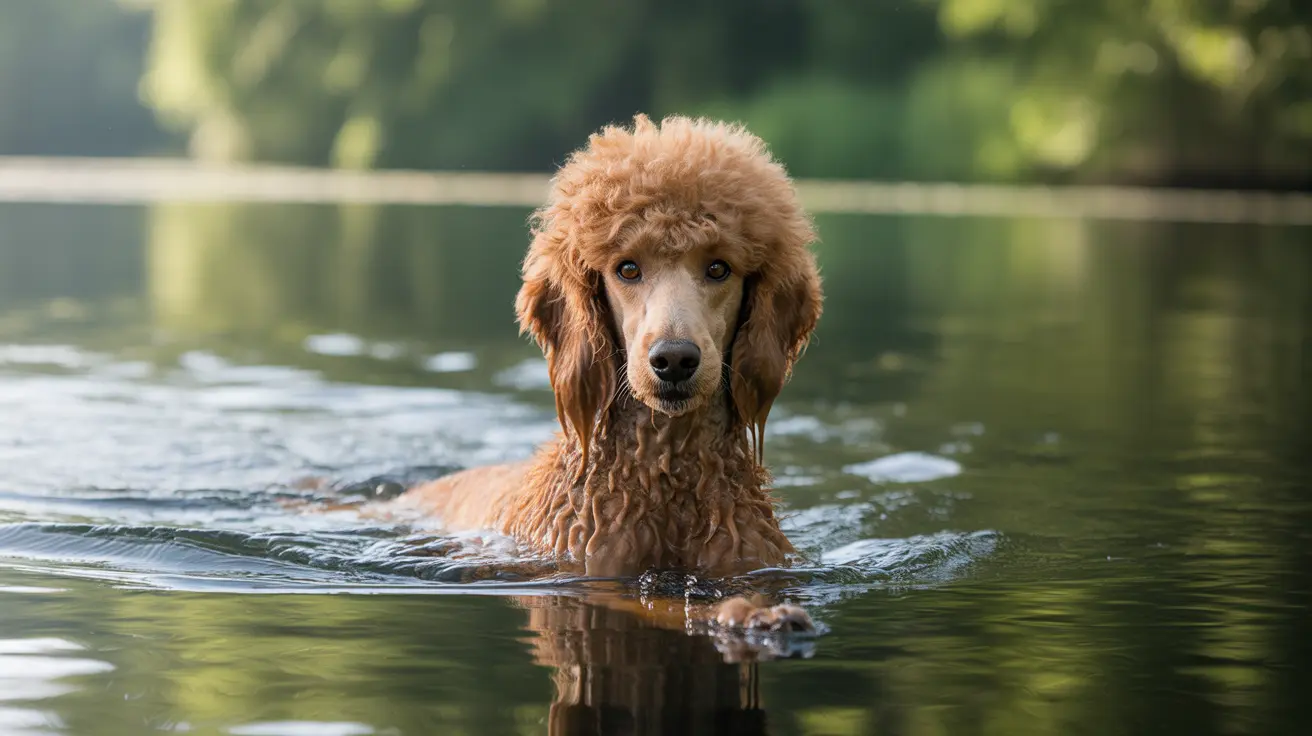When it comes to water activities, Poodles have a fascinating heritage that makes them natural swimmers. Originally bred as water retrievers, these elegant dogs have both the physical attributes and instinctive abilities that make them excellent swimmers. But do all Poodles actually enjoy taking a dip? Let's dive into everything you need to know about Poodles and their relationship with water.
The Swimming Heritage of Poodles
Poodles have a rich history as water dogs, with their very name derived from the German word "pudel," meaning "to splash in water." These intelligent canines were specifically bred to retrieve waterfowl for hunters, making swimming an integral part of their genetic makeup.
Their distinctive physical features, including a water-resistant curly coat and webbed feet, are perfectly adapted for aquatic activities. Even their famous pompom haircut, often mistaken for mere decoration, originally served to protect their joints and vital organs while swimming in cold water.
Natural Swimming Abilities
Several physical characteristics make Poodles naturally gifted swimmers:
- Athletic, streamlined body structure
- Water-resistant, curly coat
- Webbed feet for better propulsion
- Strong, muscular legs
- Excellent endurance and stamina
These features combine to make Poodles some of the most capable canine swimmers, regardless of their size variety - whether Standard, Miniature, or Toy.
Introducing Your Poodle to Water
While Poodles have natural swimming abilities, proper introduction to water is crucial for developing confidence and enjoyment. Start with these steps:
- Begin in shallow water where your Poodle can touch the bottom
- Use positive reinforcement and treats
- Never force your dog into the water
- Consider using a dog life jacket for added security
- Keep initial sessions short and fun
Safety Considerations
Even with their natural swimming abilities, safety should always be a priority:
- Always supervise your Poodle while swimming
- Ensure clean, safe water conditions
- Provide easy entry and exit points
- Watch for signs of fatigue
- Keep fresh drinking water available
- Consider water temperature and weather conditions
Post-Swimming Care
Proper after-swim care is essential for maintaining your Poodle's health:
- Rinse thoroughly with fresh water
- Dry ears completely to prevent infections
- Check and clean paw pads
- Brush out the coat to prevent matting
- Monitor for any skin irritation or ear problems
Frequently Asked Questions
Do all Poodles naturally like to swim, or can some be hesitant around water?
While many Poodles have a natural affinity for water due to their breeding history, individual preferences can vary. Some Poodles may be hesitant or even afraid of water, especially if they weren't exposed to it during puppyhood. Patient training and positive experiences can help develop confidence.
How should I safely introduce my Poodle puppy to swimming for the first time?
Start in very shallow water where your puppy can touch the ground. Use toys, treats, and plenty of praise to make it a positive experience. Never force your puppy into the water, and consider using a properly fitted life jacket for added safety.
What safety precautions and equipment are recommended when taking my Poodle swimming?
Essential safety measures include using a dog life jacket, ensuring clean water conditions, providing easy exit points, and maintaining constant supervision. Bring fresh drinking water and take regular breaks to prevent fatigue.
How do Poodles' physical traits help them swim effectively compared to other breeds?
Poodles possess several advantageous physical traits for swimming, including webbed feet, a water-resistant coat, athletic build, and strong legs. These features combine to make them naturally efficient swimmers compared to many other breeds.
What after-swim care is important to prevent ear infections and skin irritation in Poodles?
After swimming, thoroughly rinse your Poodle with fresh water, paying special attention to drying the ears completely. Check and clean paw pads, and brush out the coat to prevent matting. Regular monitoring for signs of ear infections or skin irritation is also important.
Conclusion
Poodles have a natural predisposition for swimming thanks to their hunting heritage and physical characteristics. While individual preferences may vary, most Poodles can become confident swimmers with proper introduction and training. By following safety guidelines and maintaining good after-swim care, you can help your Poodle enjoy water activities while staying healthy and happy.






